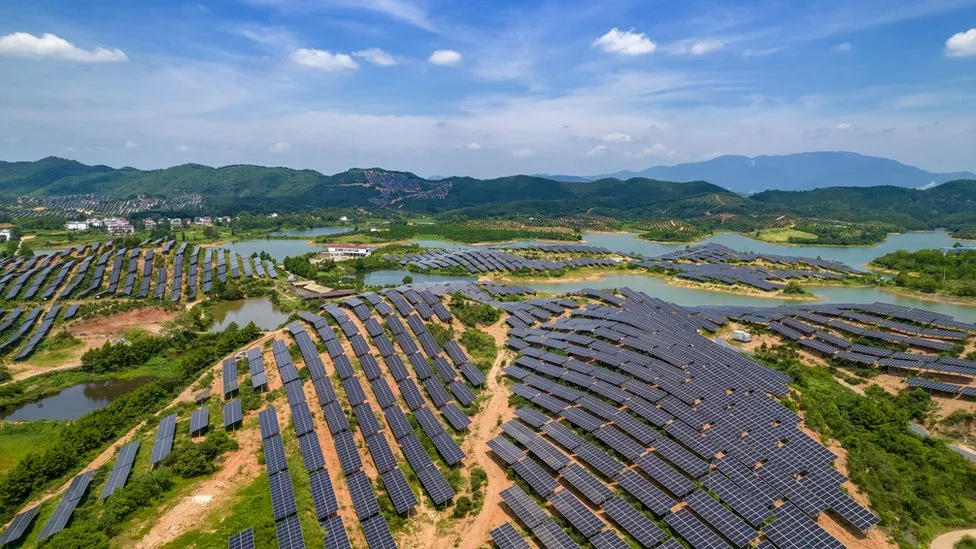It’s easy to feel overwhelmed by bad news about climate change. Even for those of us used to covering it every day as journalists, it can sometimes seem relentless.
Of course we are right to worry. This year will be the warmest twelve months in 125,000 years, scientists say, as its impacts hit home in every corner of the Earth.
But as delegates try to reach a deal at the COP28 climate summit in Dubai, there are some real reasons to be optimistic too. Here’s a look at some of them:
1 – The secret solar revolution
On streets and in estates all over the UK, there’s a silent solar insurgency going on.
Every month this year around 17,000 houses added solar panels right across Britain.
Even in parts of the UK not known for their sunny days, homeowners are sticking the silicon to their roofs; about 8% of homes on the Isle of Angelsey in north Wales are now powered by solar, in Aberdeenshire, it’s close to 6%.
Driving this boom is cost – solar is not just the cheapest form of electricity now, according to some it is the cheapest in history.
It’s not just people putting up panels in an orderly way, according to Jenny Chase, a solar expert from BloombergNEF, we’re seeing a growing amount of “balcony solar” as well.
“You literally just put your solar module somewhere maybe on your balcony, maybe in your garden, and that can cover your house’s instantaneous demand when it’s sunny,” she told BBC News.
“It doesn’t go into the grid, it doesn’t store it, you don’t need to register it. It’s just shaving a little bit off your power use.”
The world is following suit. China has installed more solar this year than the US has in the past three decades.
There’s now real hope that power from the Sun will be the key to a safer Planet Earth.
2 – The EV that pays for itself
The right time to buy an electric car must rank as one of the most popular dinner conversations across the UK.
Sales are generally booming, with some 18% of new vehicles sold around the world in 2023 powered by batteries.
But high costs and worries about the range of an electric vehicle are real deterrents at present.
However new technology is in the process of changing that perception and possibly making EVs more cost effective.
The idea is called Vehicle2Grid, or V2G and it’s essentially the kit needed to send and receive power from your car to your house and on to the national grid.
The idea is that if you can charge the car when energy is cheap, you can sell it back to the grid when it’s more expensive and turn a profit.
With cars spending 95% of their time parked up, they are perfectly suited to the role of buying and selling energy, like little four wheeled market traders.
This is critically important for the national grid which is in the process of adding more and more renewables like wind and solar, and needs somewhere to send that power when it’s too windy or sunny.
And imagine if you were charging your car with energy from your own solar panels – you could sell this free energy to the grid for a decent margin, trials have shown.
3 – Betting on big batteries
All across the UK, large scale battery farms are springing up at amazing speed – this one I visited in Buckinghamshire was completed in just 10 months.
It can power 300,000 homes for up to two hours and is one of the biggest in Europe.
Prices for storage on this scale continue to tumble, and experts estimate that by the end of this decade there will be enough batteries in place to power 18 million homes across the UK. That’s an astonishing rate of growth.
According to experts, batteries are the key link in the chain that will makes net zero achievable for electricity production.
“If you didn’t have storage, you could only have a certain amount of renewable energy,” Peter Kavanagh, chief executive of Harmony Energy, told BBC News. His company is installing large scale batteries across the UK and Europe.
“When you add storage into the mix, it makes it a lot easier to get to a majority share of renewable energy. So we can go much further to reach net zero and it makes a 100% renewables grid technically possible.”
4 – Here comes the judge
Clarity from the courts is another reason to be cheerful about climate change.
A number of major climate cases go before the judges in the next 12 months.
Whatever way they rule, it will spell out exactly where the law stands on what’s legal and who’s responsible for rising temperatures.
One of the biggest climate suits in history is taking place in the US, where Oregon’s Multnomah County is making a $52bn damages claim against a range of oil and gas producers for causing a massive heatwave back in 2021.
If they win this case, it will have huge legal and financial implications, potentially leading to dozens more lawsuits against fossil fuel producers, similar to the court struggles that big tobacco endured in the past.
One of the lawyers in the case is Jeffrey Simon, who’s well known for winning a big money opioid civil suit in Texas.
He says that the courts are emerging as the most powerful lever for climate action, by hitting fossil fuel producers in their pockets.
“Getting the defendants to reduce their emissions is not within the reach of the civil justice system in the US, but holding them accountable for the harm they’ve caused, and the misrepresentations they’ve made, which has slowed adaptation to those problems, is definitely within their power,” he told BBC News.
5 – “When hope and history rhyme…”
My fifth reason to be cheerful about climate is history.
Looking at this challenge from a historical perspective really shows how much progress has been made in an incredibly short period of time.
Just eight years ago, when the Paris climate agreement was signed, this remarkable document didn’t contain any mention of coal, oil and gas, which are the biggest sources of planet warming gases.
Now as negotiators from all over the world meet in Dubai for COP28, there’s a real hope that the parties will agree to finally end the use of these fuels in some shape or form this century.
This would consign to history the root cause of climate change and give the world a fighting chance of defeating our biggest collective threat.
(With inputs from BBC)









Comment